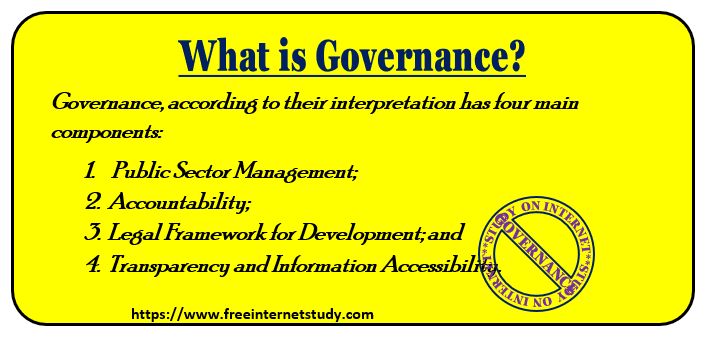GOVERNANCE : CONCEPT AND SIGNIFICANCE: Development in present times is being looked at from a holistic perspective.
GOVERNANCE : CONCEPT AND SIGNIFICANCE
GOVERNANCE
Page Contents
Development in present times is being looked at from a holistic perspective. The term which earlier referred to economic development achieved by any country now accord importance to creating an environment in which people can lead productive lives.
The wealth of any nations is its people. Hence governance system and process , which foster the development of people assume importance.
As we have discussed the term governance has gained a broader connotation. In this section let us discuss the evolution of the concept of the governance and its significance.
There are international organisation such as the World Bank, International Monetary Fund etc.
which are involved in providing financial assistance for fostering development, especially in developing countries.
During 1980s the financial aid provided by them had other functionalities which prevailed upon the developing countries for lowering or doing away with trade barriers, withdrawing the subsidies and price controls, minimizing the provision of social welfare measures, privatizing the commercial activities of public or state-owned enterprises, encouraging the entry of market-forces in several areas, fostering competition and so on.
The financial assistance was linked to the market-oriented reforms that these countries were expected to bring about .
India was also one of the countries that attempted to implement some of these measures in 1991.
Yet, after a certain period of time, it was observed by these international organisation that the result were not upto the expectations and the growth in many of the countries was slower than was originally anticipated.
This made the World Bank in 1989 examine and published its first major analysis based on its experience of Sub-Suharan Africa in 1889.
The bank published its document titled “Sub-Suharan Africa: From Crises to Sustainable Growth”, which identified certain key factor that came in the way of implementation of market-oriented reforms.
The major reason for it was considered to be the failure of public or government institution to perform their tasks in an efficient and effective manner.
What is Governance?
The Bank, hence, for the first time emphasized the need to give importance to governance. Governance, according to their interpretation has four main components:
- Public Sector Management;
- Accountability;
- Legal Framework for Development; and
- Transparency and Information Accessibility.
Governance as per these components basically implies the proper formulation and implementation of policies by government agencies, within well-defined legal framework.
It also emphasizes on people getting the necessary information , fostering openness in the system and ensuring accountability on the part of politicians and bureaucracy or administrators.
The World Bank, in 1992, in its report titled “Governance and Development” considered good governance as central for creating a proper environment which necessary for sound economic policies.
It pointed out the basic problems of governance faced by developing countries ,which include delays in implementation of projects, inadequately enforced laws, increasing competition, lack of involvement of people in design and implementation of projects etc. .
Hence, it outlined the need for striving for economic, human and institutional development, as well as achieving it through key governance processes and activities.
Governance is very important in any political system as it is the process through which the policies of a state that affect the public are implemented.
Governance depends upon the three pillars of the Constitution, namely, the executive, legislature and judiciary.
The legislature formulates the laws, the executive ( including political and permanent ) implements the laws, which the judiciary interprets the laws.
For instance, the provision of adequate health, education, housing facilities, infrastructure to the citizens requires effective governance.
Presently, there is a lot of discussion on not just governance, but also good governance. Let us now attempt to distinguished the two.
While governance deals with policy formulation and implementation, good governance tries to make this very activity not just efficient and effective but more accountable, democratic and responsive to people’s needs.
You will read about the key characteristics of governance as well as good governance in the next Sections.
Now , it must be clear to you that the concept of governance, which implies processes and mechanisms of policy formulation and implementation, is quite wide in nature.
It includes government, private sector and the community as a whole. For example, the government, intends to pursue the policy of provision for education for all.
The policy can be formulated only by the government, but its execution involves collective efforts. Governance collaboration, working together by the government, markets, and people thereby emphasizing on collective action.
It aims at maximum number of people, which cannot be achieved only by the government, so it involves a large number of people and other public as well as private organisations.
For more references click here
********If you like this article then please share it with your friends in social media********
Also read the following articles—————
The Administrative Structure of Public Administration
Top Speech on Republic Day of India : 26th January
What is Democracy: Concept and Meaning
Basic Features of The Indian Constitution

